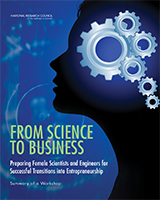NCBI Bookshelf. A service of the National Library of Medicine, National Institutes of Health.
Committee on Women in Science, Engineering, and Medicine; Policy and Global Affairs. From Science to Business: Preparing Female Scientists and Engineers for Successful Transitions into Entrepreneurship. Washington (DC): National Academies Press (US); 2012 Jul 31.

From Science to Business: Preparing Female Scientists and Engineers for Successful Transitions into Entrepreneurship.
Show detailsIn closing, Lydia Villa-Komaroff identified some of the issues raised by various speakers and workshop participants. She began by reflecting that the younger generations have grown up differently than those previous, and therefore one can anticipate changes in the data presented throughout the workshop regarding women's involvement in various entrepreneurial careers and fields as the women who are in their 20s and 30s make decisions as to where to go in their career pathways.
She noted that while a great deal of data was presented and more is always helpful, there are sufficient data upon which to begin to act. Specifically, in order to ensure that individuals of all backgrounds utilize their talents, it may not be enough to show people the data about how it is beneficial to have women actively involved, we may need to mandate change in behavior first and then buy-in will follow. Villa-Komaroff reminded everyone that we also need to be aware of our own biases and, perceptions of ourselves, and how these biases and perceptions can interfere with the ability to use our own talents. Courage, she stated, is not an absence of insecurity or fear, it is action in the face of those insecurities and fears.
Villa-Komaroff concluded by suggesting actions that could follow from the workshop:
Members of the audience then offered their personal and professional experiences that enriched this session. Some of the points made by various participants include the following.
The final discussion highlighted the wide range of career opportunities available to women in scientific and technical areas beyond traditional academic careers. Through meetings and workshops such as this one, these careers can be better understood and many important lessons can be learned from those who have been successful in entrepreneurial careers. Further, as many of the presenters articulated, careers vary and change over time, so women entrepreneurs should feel free to exit and enter a variety of opportunities as they arise over the span of their professional lives.
- THEMES FROM THE WORKSHOP AND CLOSING REMARKS - From Science to BusinessTHEMES FROM THE WORKSHOP AND CLOSING REMARKS - From Science to Business
Your browsing activity is empty.
Activity recording is turned off.
See more...